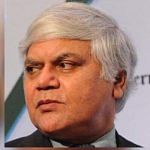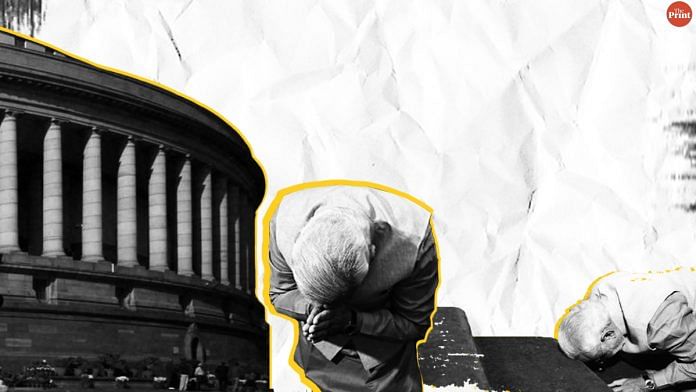As the 16th Lok Sabha sitting ends, the Congress’ Sonia Gandhi called PM Narendra Modi government’s full majority a ‘wasted mandate’ that ‘weakened Parliament’. The Modi govt pushed through bills in the Lok Sabha, but ran into hurdles in the Rajya Sabha. The current Parliament worked for more numbers of hours than the previous, passed more bills and referred fewer to the standing committees, according to PRS.
ThePrint asks: Did a full majority Modi govt help Parliament perform better or has politics derailed it?
On many occasions, the highest law-making body was reduced to a formality
 Chakshu Roy
Chakshu Roy
Head of legislative and civic engagement, PRS Legislative Research
After three decades, the 16th Lok Sabha witnessed a government with a single party majority. The majority was expected to enable smooth functioning of Parliament and passage of legislation. In the last five years, the government was able to pass 133 bills. Key bills piloted by the finance and social justice ministries were approved by Parliament.
These included bills like GST, insolvency and bankruptcy code, Aadhaar, increase in maternity benefit for women, reservation for the economically weaker section and constitutional status for the OBC Commission. However, it was not smooth sailing for the government’s legislative agenda. The opposition either successfully blocked or delayed many government bills.
Marque government legislations like land acquisition amendment, triple talaq, and Citizenship (Amendment) Bill were blocked and will now lapse at the end of this Lok Sabha. This was because of governments’ lack of numbers in the Rajya Sabha.
Opposition parties forced referral of some bills to select committees of the Upper House before agreeing to pass them. But a number of bills were fast-tracked through Parliament without referring them to a parliamentary committee.
In this Lok Sabha, 70 per cent of the bills did not go through the scrutiny of parliamentary committees.
On important issues like GST, the government had to build consensus before Parliament approval could be secured. But this spirit of building consensus was missing on many issues over the last five years. This reflected in parliamentary proceedings getting adjourned and on occasions, the highest law-making body was reduced to a formality.
Prime Minister Modi has confused Parliament with BJP party office
 Jaiveer Shergill
Jaiveer Shergill
National spokesperson, Congress
We all remember when PM Narendra Modi first entered Parliament, he bowed before the institution, but ever since then the prime minister has done everything to demean the temple of democracy. He has set a ‘new normal’ for parliamentary debate. The spirit of dialogue and truth have been forced to take a back seat and communication has been reduced to pure rhetoric.
Even in his Motion of Thanks to the President’s Address, PM Modi used the floor as a stage for election campaign and his deliberate insult to the opposition was a repetition of what Modi does the best – desecrate the prime minister’s chair.
It is not the first time a single political party has majority in Lok Sabha. In the past, many prime ministers had brute majority in Parliament, but they never undermined the institution of parliamentary democracy because they were leaders of democratic character. Majority in Parliament could never induce them to resort to steamrolling the opposition.
When staunch Communist critics like Hiren Mukherjee would speak in Lok Sabha, Jawaharlal Nehru would rush to Parliament from Teen Murti Bhawan to listen to him. It was Narasimha Rao who sent Atal Bihari Vajpayee, then an opposition member, to represent India at the United Nations. In the current session, when Union minister Nitin Gadkari replied to a question in the Lok Sabha to the satisfaction of the house, opposition leaders including Sonia Gandhi appreciated him.
Unfortunately, Modi and his arrogance have failed to uphold the rich traditions of parliamentary democracy. In the Parliament and outside of it, the prime minister is behaving more like a party man than a statesman.
Parliament’s productivity in last five years proves having a full majority govt helps
 Narendra Taneja
Narendra Taneja
National spokesperson, BJP
Parliament performed better, delivered better and debated better because of a full majority NDA government. Parliament is a platform for debating, monitoring progress and making sure that the mandated will and wishes of the people are fulfilled. The last five years have seen some fantastic work being done on the floor of Parliament – from the number of bills that were tabled and passed to the quality of debate. Even on difficult issues, like GST, reservation and triple talaq, Parliament came together and delivered.
On many occasions, there was much noise and disruptions, but Parliament still delivered thanks to a full majority government. Sometimes the opposition opposed just for the sake of it and not because it wanted to generate a healthy debate. The principal opposition party was too small and technically, had no leader – which was unfortunate. The opposition was too fragmented and had no nucleus.
In the Rajya Sabha, the opposition was more interested in showing its strength to the government than having a serious discussion. One has to accept it as a part of democracy. But in totality, Parliament’s productivity showed that it helps when there is a full majority government. The majority in Lok Sabha had a positive impact even on the Rajya Sabha, and India made path-breaking progress.
Also read: Parliament weakened, NE burning — Sonia Gandhi calls out Modi govt’s ‘bluff & bluster’
Modi govt has rather brazenly disrespected Parliament and democratic procedures
 Shivam Vij
Shivam Vij
Contributing editor, ThePrint
It is not surprising that a full majority government feels a lesser need to take Parliamentary consensus than a coalition one. Even so, the Modi government has rather brazenly disrespected Parliament.
The government passed too many ordinances. Was it really so urgent to penalise triple talaq with three years in prison that an ordinance had to be promulgated? The government promulgated an ordinance to amend the land acquisition law, but then let the ordinance lapse. If only it had let Parliament debate the amendment, it could have given up on the idea more quietly.
Bills that the government fear may get stuck in the Rajya Sabha, such as the one on Aadhaar, were converted into money bills when they were not about government finances alone.
Too many Bills are passed without debate and discussion, and without being referred to standing committees for deeper deliberation. A recent example of this is the poorly drafted bill to provide reservations for the economically disadvantaged amongst the general category that was pushed through on the last day of the session, without advance notice, and by extending the Rajya Sabha by just a day.
The number of sittings has also come down. In 2017, Parliament sat for only 77 days, the lowest since 1999. The same year, the winter session was delayed because the government didn’t want to give the opposition a chance to make noise on various issues on the eve of the Gujarat assembly elections.
These actions and more have shown how a full majority government has been disastrous for the second pillar of democracy, the legislature.
While Lok Sabha saw greater productivity, Parliament as a whole was a different story
 Ruhi Tewari
Ruhi Tewari
Associate editor, ThePrint
Parliament in the last five years has presented a tale of dichotomy – a Lok Sabha that passed many bills and a Rajya Sabha that resisted many. Prime Minister Narendra Modi-led government’s healthy 2014 mandate made the passage of bills a breezy affair in the Lower House, but its lack of numbers in the Upper House ensured the opposition always had the upper hand there.
The statistics reiterate this trend. The Lok Sabha in these five years was more productive than in the UPA II years, while the Rajya Sabha has been less productive. How differently both these Houses have functioned in terms of productive time and number of bills passed makes it difficult to label Parliament’s performance as a whole.
However, it is true that the bitter political equations between the government and opposition, the BJP’s complete reluctance to reach out to the other side and, in turn, the opposition’s obstinacy, meant a lot of legislative business went unfinished. It also meant important debates were disrupted because of tussles.
Because of its mandate, the BJP thought it could steamroll its way through in Parliament. This irked an already hostile opposition even more. Thus, while Lok Sabha may have seen much legislative business being conducted, thanks to the BJP’s majority, Parliament as a whole was an entirely different story.
Also read: We must question our MPs when Lok Sabha session works for less than 50% of total time




1. These views provoke readers like me to think about effectiveness of Parliament as a platform of people’s wishes. 2. We must endeavor to make Lok Sabha a platform for good governance, irrespective of party/parties in power. I think we need to consider a few reforms to make Lok Sabha more effective. 2. Our Parliament must introduce new rules of conducting business of both houses of Parliament; disrupting proceedings of Parliament must be punishable with immediate suspension for a day. Those who disrupt proceedings often and more than once should be barred from entering the House for an entire session. 3. As per our existing election law, First Past the Post (FPTP) is a rule under which a winner is declared. We know that the FPTP rule creates many distortions: a candidate securing as low as 25 % votes may be a winner in a Lok Sabha election. This is hardly a satisfactory situation. 4. Question is this: has time come to reconsider FPTP and think about having ‘System of Proportional Representation’ (SPR) at least for some 33% of total Sabha seats? I believe our political parties should debate having SPR, which I believe can be a major election system reform. 4. Lastly, we must restrict tenure of a MP to say 15 or 20 years.
One cannot recall the Rajya Sabha …
The political capital that was expended on trying to amend the land acquisition law – giving rise to the Suit boot jibe that did so much harm – should instead have been used to get GST airborne very early in the term, allowing for a thoughtfully drafted scheme that would have been at fruit bearing stage today. The government should have reached out to Dr Singh and Shri P Chidambaram, told them, Bhai Saheb, yeh toh aapka idea tha, isse anjaam par laane mein sahkarya kijiye. Shri Kharge should have been conferred LoP status, no need to refer the issue to AG Mukul Rohatgi. The Speaker should have been less openly partisan, whether on classification of Money Bills or a hundred other things. Consensus building to get the people’s work done becomes impossible if the declared intent is a Congress mukt Bharat. One cannot the Rajya Sabha ever having been an implacable foe in the past, standing in the way of well drafted laws that are in the public interest. As the sun sets on the sixteenth Lok Sabha, one feels no nostalgia.